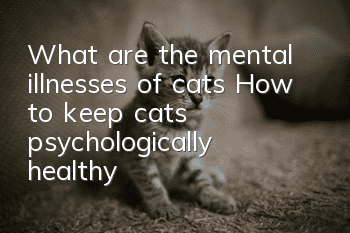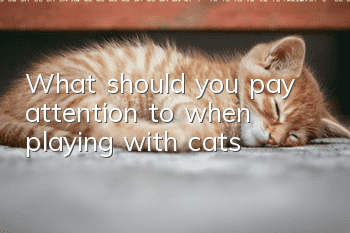What are the mental illnesses of cats? How to keep cats psychologically healthy

Sometimes the psychological harm a person suffers is more difficult to heal than the physical one. In fact, the same is true for cats. Many times we focus on the cat’s food, clothing, housing and transportation, but ignore the cat’s mental health. The most common one is the owner. A cold cat will, to a large extent, think that it has fallen out of favor, which will lead to depression and mental illness. This needs our attention.
1. What are the mental illnesses of cats?
1. Anxiety of falling out of favor
Most adult cats have a strong "territory consciousness" and will feel stressed due to the invasion of foreign creatures. The occurrence of abnormal behaviors is called a way to vent their anxiety about falling out of favor. Sensitive cats will have thoughts such as "My owner doesn't love me anymore", "I have no place at home", "Am I about to be kicked out", and the feeling of abandonment is always present. A strong cat will fight with fists and kicks, while a weak cat will hide in a corner and feel sad. The cat becomes haggard, loses hair, vomits for unknown reasons, and has a drastic change in temperament. Treatment method: Add a new member. The cat must be under three years old. The running-in period is about 2 to 3 weeks. The owner must not devote all his attention and care to the new cat. Member, "Tubawang" needs your love even more.
2. Environmental discomfort
Cats are very nostalgic animals and like a stable environment. Once the environment changes, their mental state will also change. Physiologically, it may manifest as unexplained vomiting, hair loss, or not eating, and even some strange movements to relieve tension and uneasiness. Repeatedly licking a certain part of the body is a sign of obsessive-compulsive disorder. Treatment method: Let the cat rest properly, adjust it, and try to use its usual toys, food utensils, and toilet in the new environment.
3. Sound phobia
The sound frequency that cats can hear is between 30 and 45 kilohertz, while humans can only hear sounds between 17 and 20 kilohertz. Cats can hear sounds that humans cannot hear. Cats are afraid of some sounds that humans are accustomed to, such as loud noises.
2. How to make cats mentally healthy
1. Cats communicate by sharpening their claws, and they can also maintain their claws. Therefore, in a cat-loving living environment, prepare at least a climbing frame and a little space nearby for cats. And train the cat to learn to use the climbing frame. If your cat doesn't learn to use a climbing frame, she will find an alternative in the room.
2. Cats kept indoors do not have to run around looking for food, which can lead to boredom and obesity. The owner should train the cat to praise some small acrobatics and give small rewards with delicious food. Throw the reward out and let your cat chase it. You can also consider placing a small amount of foodIn other locations, let the cat find the scent on its own.
3. Create some vertical space to make your cat happier. Cats like to jump to high places and look down. Jumping at the same time can also keep cats active. A tall perch will serve this purpose. If two or more cats live in a small space, climbing frames and perches can provide more space for the cats and reduce the stress caused by limited space.
4. The location and hygiene of the cat litter box also have a great impact on the cat’s psychology. The first reason why cats urinate everywhere is that the location and hygiene of the litter box are not to the cat’s liking. Many cat behavior experts recommend that cats have their own litter box.
5. Although cats become less playful as they age, games are still a great way to keep cats mentally healthy. Many cats can play with toys on their own, but interactive play with their owners is crucial to a cat's mental health. The act of raiding, chasing and biting in the game can eliminate boredom and provide physical exercise. Don't give up playing with a cat that seems uninterested in playing. The owner can slowly find toys that interest her (feathers or laser pointers, etc.) and play with the cat.
6. To keep your cat happy, you can set up a bird feeder outside the window so that the cat can observe the birds through the glass. You can also keep a small aquarium at home. These measures can provide a lot of stimulation to cats who are eager to hunt.
In fact, cats need our care just like children. Cats’ mental illness is mostly caused by the owner’s negligence, so the owner’s companionship and love are what all pets need. I hope you can spend more time with your pets. They don't live very long.
- What should I do if my cat suddenly has diarrhea? How to care for Garfield’s diarrhea!
- Is the cat sneezing because he has a cold? Poop scoopers should pay attention!
- What color does the world look like in a cat’s eyes?
- Why do cats pee randomly? And how to solve it?
- What to do if a cat vomits? What are the causes of vomiting in pet cats!
- Why does a cat sneeze and shed tears?
- Which is better to keep, Abyssinian or Exotic Shorthair?
- What should I do if my cat doesn’t like to sleep in the cat’s nest?
- Five Ways to Buy the Best Cat Food
- Cat keeps itching



